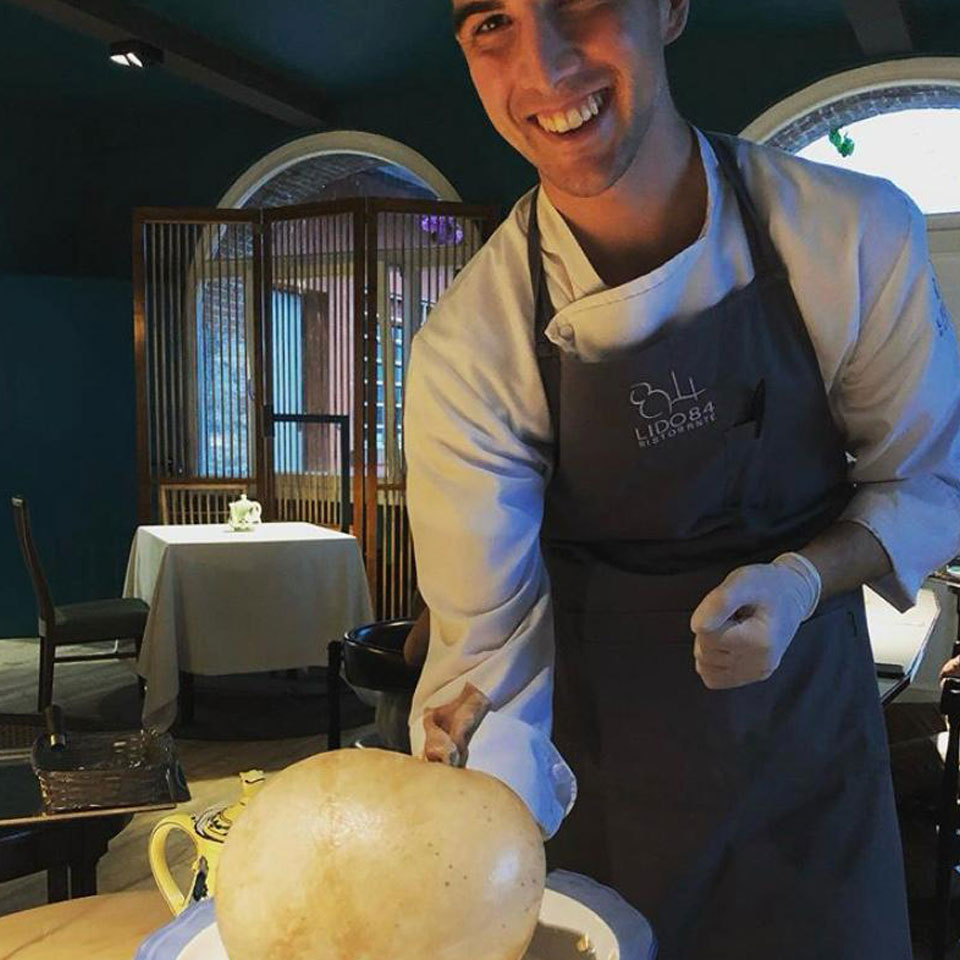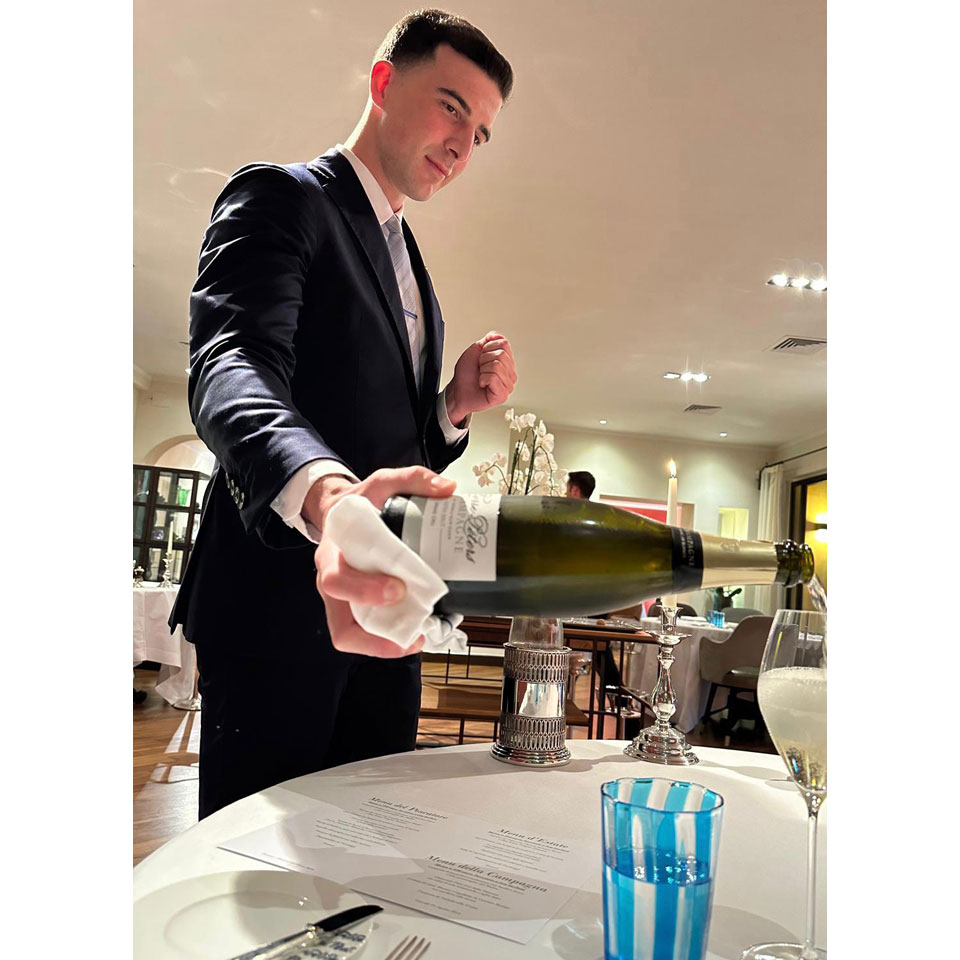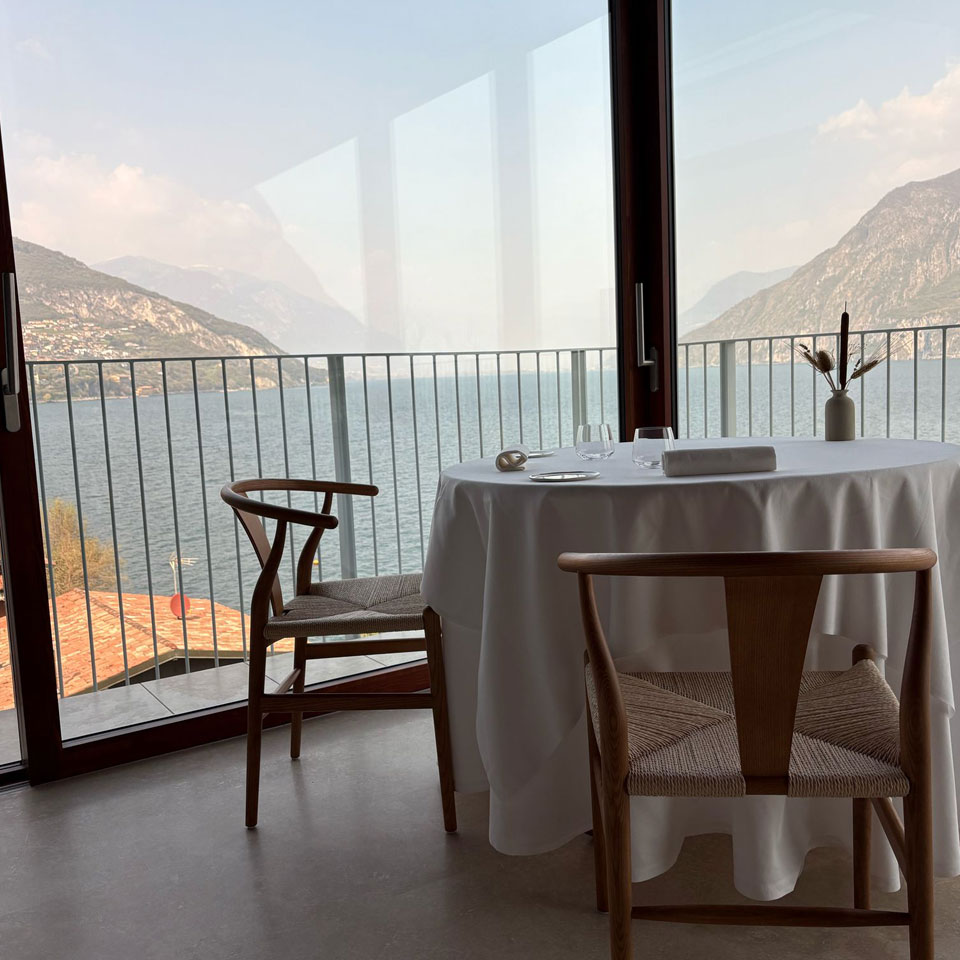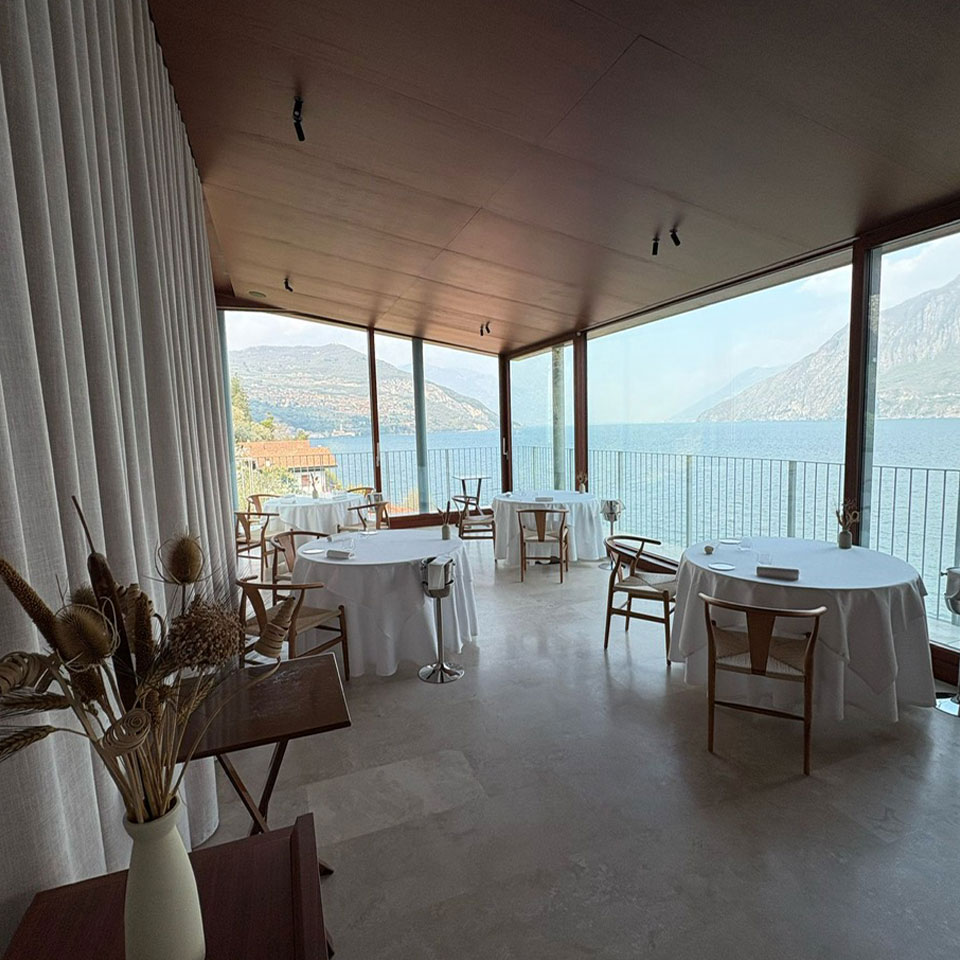Haute cuisine is something that is often talked about but often apropos, difficult to approach for those who do not have an inside look, an objective eye and, above all, long experience.
That's why RGLife had the pleasure of having a chat with Lorenzo Chinosi, the person with this kind of background, a chef by training and a career dining boy, to whom we asked a few questions to understand more about star kitchens, an overused adjective but one that helps frame the context in which Lorenzo grew up and of which he offered us a very interesting glimpse.

(In this shot, Lorenzo Chinosi serves rigatoni cacio e pepe in pork bladder, a true Must at Lido 84 in Gardone Riviera)
Hi Lorenzo, what has been your path in the restaurant world so far?
My path in the restaurant world was not born out of passion but out of necessity. After finishing high school in science, I left Milan, went to live for six months in London and for another six in Sydney. My only goals at the time were to enrich my cultural background and learn English. Without specific skills, I sought employment as a cook's helper in both cities, hoping to support my stay abroad. Returning after a year in Italy, I continued to work in the kitchen within small establishments maturing, in the process, the ambition to be able to improve my skills to be part of gastronomic kitchens. In 2019 I had the good fortune and privilege of joining Riccardo Camanini's kitchen at Lido 84 in Gardone Riviera.
Can you tell us more about this experience? In particular, how did you integrate with the rest of the staff?
My arrival was very impactful: from small teams to a brigade of ten cooks, clear hierarchies and very precise tasks assigned on a daily basis. Adding to the difficulties was table service in the restaurant. If I had to define it, I would say unique and rigorous. Part of the kitchen brigade, during meals, comes to the dining room to take care of the guests, explaining to them all the steps in the preparation of individual dishes: in fact, no one can convey the emotion behind each dish prepared better than a cook. This was my role at the restaurant. I therefore spent a lot of time in contact with guests, time that made me fall in love with room service and hospitality in general. At the end of that year, thanks to the recommendation of the then sommelier Manuele Menghini, a good friend of mine, I landed at the restaurant Dal Pescatore in Canneto sull'Oglio, hoping to convert from cook to waiter.
How did the transition from Lido 84 to Dal Pescatore come about? [Recall that Dal Pescatore is the longest-running starred restaurant in Italy. The third star came in 1996 and has not been lost since then ed.].
When I arrived in Canneto, it began what I can call the most important experience of my life. The Santini family welcomed me, passing on to me the values of serving great tables. I would say not an easy mission, considering my training as a cook. I was in Canneto almost six years, spending quality time with guests and colleagues.
Two very different experiences then, both as an approach to cooking and service. Can you explain the points of contact and differences?
I find the approach to cooking of both to be similar: extremely identity-driven, with a deep and technical style that never veers into unnecessary virtuosity. For both, respect for taste and ingredient are cornerstones. Experiencing two houses with this approach has definitely been a great blessing.
Can you tell us more about your approach to such identity gastronomic realities, particularly with respect to the materials used in the kitchen?
I have always loved to define cooks and waiters as 'artisans': each artisan meticulously cares for his or her work station and tools. Each tool, if well cared for and well placed on the workbench, helps the professional to affinare the act, constantly elevating it. Having to mention one for the kitchen, I would definitely say the knife. Every cook has his or her own personal set and I would add not to be shared with others.
As for the mise en place?
I find that every element of the table is extremely important to give the guest the right ease. Mentioning a couple, I would definitely say the stemware, which is essential to enhance the nuances of each wine, and the choice of dishes, the foundation that makes a dish a creation, a true work of art.
Would you name one iconic dish for both restaurants, the one you absolutely must try if you were lucky enough to taste such innovative cuisines?
As a lover of pasta dishes, I would say fermented black garlic rice at Lido 84. Tortelli di zucca, mostarda, amaretti and Parmigiano Reggiano at Dal Pescatore.
Your experience at Santini's ended quite naturally. How did you mature this choice and what is the new path you have taken?
After several years spent alongside the Santini family, I was beginning to have the desire to put into practice all the lessons I had received in a new project. I recently received and accepted a proposal of collaboration from an old colleague and dear friend, Angelo Bonfitto [chef and owner of Zu Restaurant in Riva di Solto (BG) ed.] The passion we share for catering has made us join forces to be able to welcome guests and friends on the shores of Lake Iseo in the most authentic and genuine way possible.
What do you think will be your approach in the dining room in this new adventure?
We will try to take care of every detail with great precision, research and study, prerogatives that are always the basis of every great project.
We imagine that in so many years of work you have noticed a change - an evolution? - in the chefs' approach to cooking. And, why not, in the clients as well.
Speaking of chefs, they are increasingly focused on making their kitchens 'sustainable,' a sustainability not only related to the choice of products, but also and especially to the lives of their employees. Many are striving to ensure that their employees have a proper balance between work and leisure time-this is definitely the greatest value.
Speaking of guests, I find it always inspiring to have the opportunity to bridge between their passion and our expertise, in an age when information related to gastronomy is increasingly usable. This allows us insiders to engage with clients from all over the world, drawing insights from them on a daily basis.
We have not yet talked about the relationship with colleagues, the people you spend the most time with during a professional experience, even more so if that experience takes place within a restaurant.
One of the things I am most proud of is the privilege of having spent whole days in close contact with colleagues who, over the years, have become close friends of mine. We often found ourselves not only sharing work days, but also time outside the restaurant. Having different origins and residences, both Italian and foreign, we also chose to share lodging so that we could be close to the restaurant.
The bond that is created in these situations is hard to explain; the passion and the predisposition for improvement that we all nurtured was the glue that still unites us years later.
Lastly, we would like to ask you what kind of path you think a young person who wants to join the restaurant world should take, with aspirations of entering the highest level kitchens as you did.
Thinking back to my own path, I think it is crucial to apply to a big restaurant. Contact with professionals of this caliber is crucial. Only they can really convey the love for this profession. Secondly, of course, I suggest devoting the right amount of time: great results are achieved over many years.
What do you think the characteristics of a facility and its work team should be today?
I think the greatest ambition of us operators is to find a precise, understandable identity. To reach the guest in the most genuine and direct way possible.

(Above, a shot of Lorenzo Chinosi serving tables at Dal Pescatore restaurant in Canneto sull'Oglio)
In thanking Lorenzo for his testimony, we can only imagine what a privilege it has been to work on the staff of restaurants of that caliber, and we are certain that Zu will be another fortunate chapter in his fine professional story.


A preview of the newly renovated room at Restaurant Zu, with a view of Lake Iseo.
